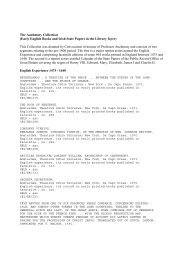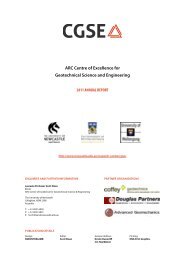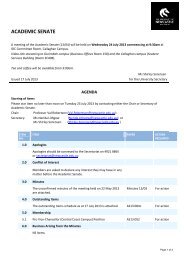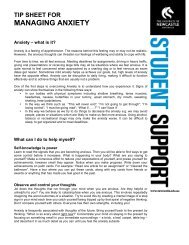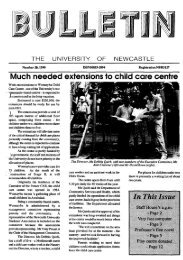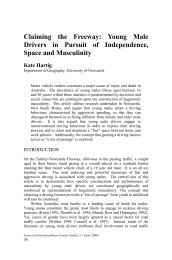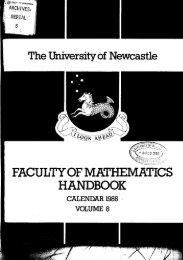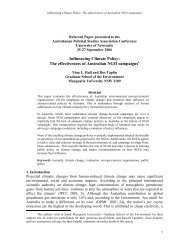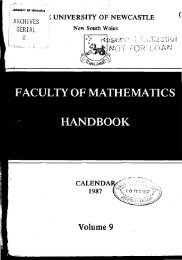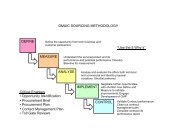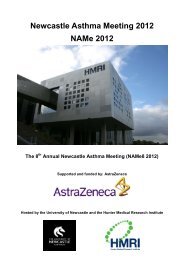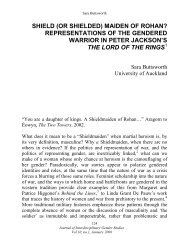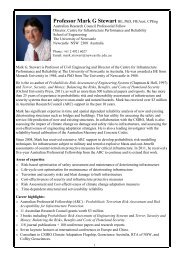n - University of Newcastle
n - University of Newcastle
n - University of Newcastle
You also want an ePaper? Increase the reach of your titles
YUMPU automatically turns print PDFs into web optimized ePapers that Google loves.
sriii IHTPODOCTIOX.<br />
It mar possibly be asked why our blackfellows had so strong a<br />
disinclination to mention the name <strong>of</strong> a friend who had died.<br />
We oursel~es have a feeling <strong>of</strong> the same kind. We speak <strong>of</strong> Gur<br />
friend as ' the deceased,' ' the departed,' 'him who has gone ' ; and<br />
if we must mention his name, we apologise for it by saying 'poor '<br />
Nr. So-and-so, and seem afraid to use the simple word ' dead.'<br />
But our indigenes have a stron$erreasou than that. They believe<br />
that the spirit <strong>of</strong> a man, especially if he is killed by violence, is<br />
escessively uncomfortable after death, and malicious, and in its<br />
fretfulness ready to take <strong>of</strong>fence at anything, and so pour out its<br />
mth on the living. Even the mention <strong>of</strong> the dead man's name '<br />
would <strong>of</strong>fend, and bring vengeance on them in the night time.<br />
Our blacks seem also to have the idea that the deceased, for a<br />
certain nuinber <strong>of</strong> days after death, has not yet got his spiritual<br />
body, mhich slowly grows upon him, and that, while in this undeveloped<br />
state, he is lilie a child, and is specially querulous and<br />
vengeful.<br />
IT. TESTS w EXAMINING LAKGUAGES.<br />
I nor proceed to show some results which may be obtained<br />
even from our Australian words, by cornparing them with others<br />
else~here. It is agreed among philologist^, that tbere is no surer<br />
test <strong>of</strong> the affinity <strong>of</strong> different languages than that which comes<br />
through the identification <strong>of</strong> their pronouns, numerals*, and, to a<br />
less extent, their prepositions. To this I mould add, in our present<br />
inquiry, the identity <strong>of</strong> such common rrords as 'eye, foot, hand,<br />
fire, sun, moon,' and the like; for these words cannot have<br />
been used much in the names <strong>of</strong> individuals, and are therefore<br />
not likely to have suffered from the fluctuations which I haw<br />
already explained. It is true that, in all languages, the pronouns<br />
and the nuulerals are subject to ahrasioll and decay, from the<br />
frequency and rapidity with mhich they are pronounced, and from<br />
a natural tendency ererymhere to shorten the ~ords which are<br />
most in use. But it is the function <strong>of</strong> the philologist, not only to<br />
uilderstand these causes <strong>of</strong> decay, but to show the process by<br />
which the words fell away, and to restore them to their orighal<br />
forms for the purpose <strong>of</strong> identification.<br />
It is agreed, then, that the numerals, the pronouns, and, to<br />
some extent, the prepositions, are a strong test <strong>of</strong> the affinity <strong>of</strong><br />
langliages. On this principle, such languages as the Sanskrit, the<br />
Greek, the Latin, the German and Gothic, the Lithuanian, the<br />
Keltic, have been tested and proved to be so much akin that they<br />
are grouped as a well-defined family <strong>of</strong> languages-the Aryan.<br />
Some anthropologists, especially when they are not linguists themselves,<br />
sneer at the labours <strong>of</strong> philology as deceptive and liable to<br />
* Eopp says that the lowest numerals can nerer be introduced into any<br />
country by foreigners.<br />
serious error ; so are all sciences, if not managed mith care and<br />
ability. A student in chemical analysis and synthesis may get<br />
results m-hich are clearly erroneous; instead <strong>of</strong> declaring the prescribed<br />
methods to be faulty or his materials to be bad, he ought<br />
to blame only his own want <strong>of</strong> skill in ma~~ipulation. As to the<br />
utility <strong>of</strong> philo y I would only remark that it was by the study<br />
<strong>of</strong> languages tha %dh e place <strong>of</strong> Sanskrit (aud coilsequently <strong>of</strong> the<br />
Hindu race) was determined in its relation to the other members<br />
<strong>of</strong> the family I have named, and it was philology alone that<br />
settled the clairn <strong>of</strong> the Keltic, and consequently <strong>of</strong> the Kelts, to be<br />
regarded as one <strong>of</strong> the most ancient members <strong>of</strong> the Aryan family.<br />
In the case <strong>of</strong> the cuneiform inscriptions, the services which<br />
philology has rendered are inestimable. And it is quite possible<br />
that, amid the conflicting opinions as to the origin <strong>of</strong> our<br />
Australian race, the via prima snlufis, the first dawn <strong>of</strong> a sure<br />
daypght, may in the future arise from a careful examination <strong>of</strong><br />
their language.<br />
As is well known, the Australian numeral system is very limited<br />
in its range ; our natives say ' one,' ' tro ' ; sometimes 'three ' ;<br />
occasionally 'hand' for 'five'; all else is 'many,' 'a great number.'<br />
It mas alleged by Sir John Lubbock, and has since been repeated<br />
by everybody, that their haying separate words oilly for 'one' and<br />
'two ' is a pro<strong>of</strong> that Australians possess very limited mental<br />
powers, since they cannot count higher than 'two.' Every colonist,<br />
who has been much in contact with the blaclis, cnn adduce pro<strong>of</strong>s<br />
to shou- that their mental powers are not so limited, and that,<br />
when our indigenes are taken out <strong>of</strong> their adverse ' environment<br />
and encouraged to cultivate their intellectual faculties, they<br />
readily develope a decided capacity for improvement. A friend<br />
<strong>of</strong> mine, fifty years ago, taught two youaq black boys to play<br />
chess; they soon acquired a likiug for the game, and learued<br />
to play nith caution and skill, and even with success. If it<br />
were possible to surround the blacks mith favourable influences<br />
continued from generation to generation, I have no doubt that<br />
their whole position would be altered ; but any final separation<br />
from &heir ancestral habits would lead to thew speedy extinction<br />
as a race ; this mas the issue that was rapidly approaching after<br />
the last remnants <strong>of</strong> the Tasmanians n-ere removed to Flinders'<br />
Island. But, for many hundreds <strong>of</strong> years, no one can tell how<br />
many, the Australian race has lived in the midst <strong>of</strong> adverse<br />
surroundings, tribe warring against tr~be, each tribe restricted<br />
to its own boundaries, the supply <strong>of</strong> food in our precarious<br />
climate <strong>of</strong>ten scanty, the paralysing terror produced by their<br />
strong belief in the supernatura! power <strong>of</strong> demo~ls and <strong>of</strong> their<br />
own wizards, the ravages <strong>of</strong> waves <strong>of</strong> disease and death sweeping<br />
over them from time to time; all these and other causes compelled<br />
them to think only <strong>of</strong> their daily subsistence and the



